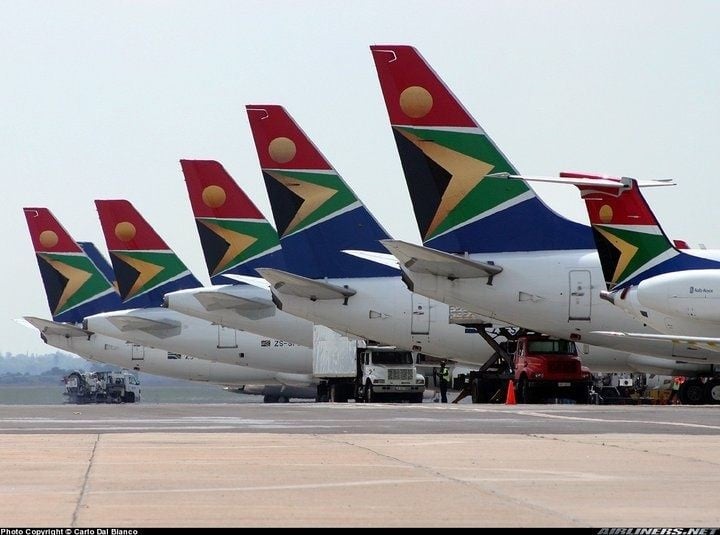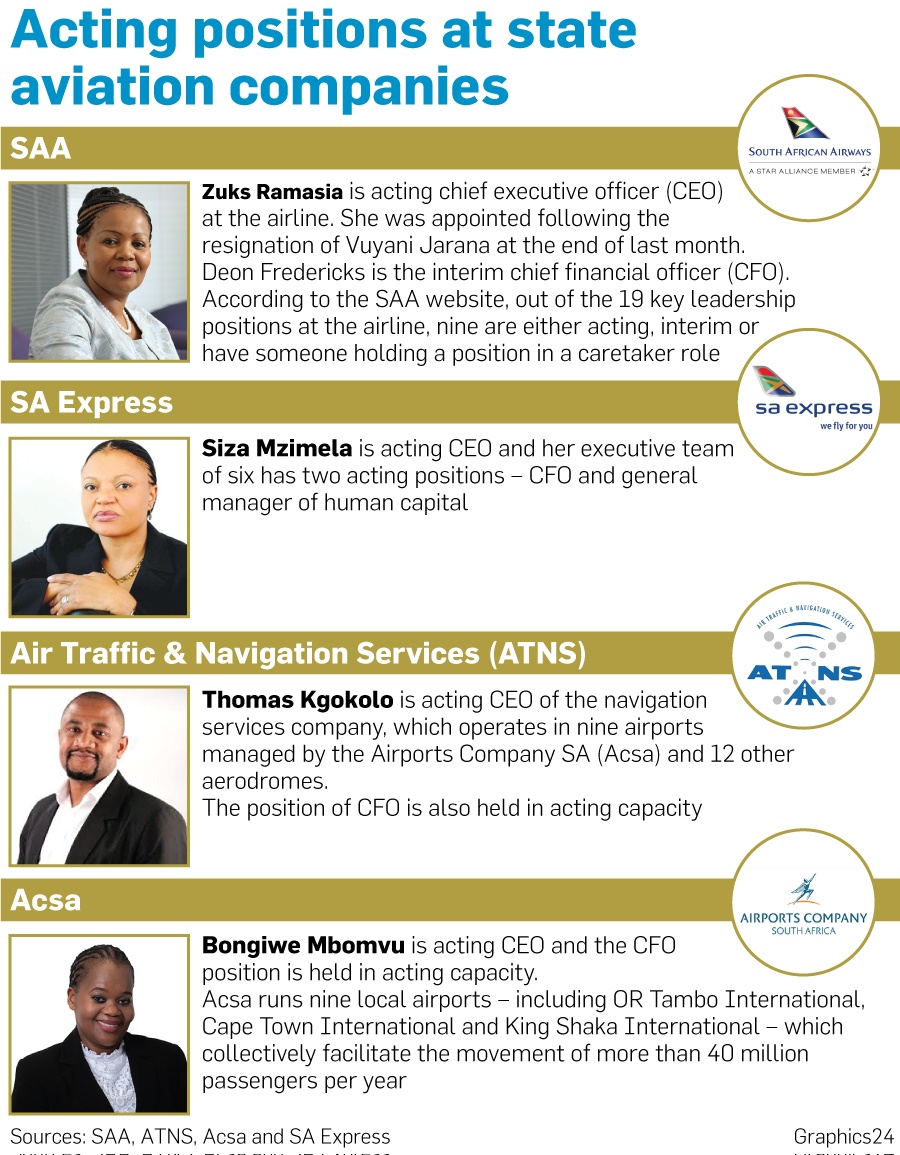
Organisation representing at least 30 airlines flying to and fromSAsays the musical chairs plaguing SOEs is causing ruinous turbulence.
The organisation that represents 30 international airlines that fly to South Africa has expressed unhappiness with the fact that the four aviation enterprises owned by government have “too many people who are in acting positions”. This is according to the Board of Airline Representatives of SA (Barsa) CEO June Crawford.
SAA, SA Express, Air Traffic & Navigation Services, and Airports Company SA (Acsa) all have acting CEOs and acting chief financial officers, while SAA and SA Express also have other people in acting roles in key positions.
“This is just part of the malaise at state-owned enterprises [SOEs]. That doesn’t create confidence in the industry. It is certainly disruptive for my airline members – international and African airlines,” said Crawford.
“Although there are people in place, we all understand it is temporary. We would like to see those positions made permanent as quickly as possible. It doesn’t allow for continuity. You will be discussing a major issue with one party and then you suddenly find yourself having to talk to someone else about it.”
Aside from the 30 international airlines that Barsa represents, including SAA, the association also includes 17 “strategic” aviation partners, among them local airports, ground and cargo handling services, Business Unity SA, travel and tourism organisations, and vehicle rental organisations.
“I think a strong national carrier is exactly what a country needs – look at [Australian airline] Qantas. So a strong aviation industry needs strong domestic aviation and then it follows that you will have strong international aviation. For me, there is definitely a place for SAA,” Crawford said.
“The biggest thing for airlines is the agility when it comes to decision making. That is the biggest thing. Gone are the days when it would take an airline a number of months either to put a service in place to a destination or take it out. You have got to be nimble and agile.”
On the recent departure of Vuyani Jarana, Crawford said the former SAA CEO’s resignation “was an absolute shock. We didn’t see that one coming. I don’t think anyone was expecting it, to be honest. Even people within the organisation were surprised.”
Crawford said she got to know Jarana through Barsa. “I know him – this is a busy man – but we have had a couple of chats. He is a good man.”
In his resignation letter, Jarana said SAA was “an entity in financial distress, an intensive care unit case. From 2018 to date, we have had no less than three incidents in which the company was almost unable to pay salaries due to lack of funding.”
Crawford said: “I think SAA seriously needs to be recapitalised. Competing with other carriers [without adequate funds] is obviously going to be difficult. The best way to deal with this is to find an airline equity partner. Someone that can come in and support it in terms of refleeting it.
“It needs the skill coming from a successful carrier – whether that is African or otherwise.”
However, Crawford said it would be “difficult” for any outside airline to buy into SAA given the state described by Jarana.
“There are still parts of SAA that could be attractive. Some years ago, it was close to finding an airline partner, but that fell by the wayside,” she said.
John Ashbourne, an economist at Capital Economics, wrote in a recent note that SAA’s domestic and regional services were profitable and could probably find a buyer if they were separated from the firm’s loss-making long-haul business.
The end of SAA’s intercontinental service would do little to reduce competition or push up prices for flights from Johannesburg, Ashbourne said.
In his resignation letter, Jarana also wrote: “Uncertainty about funding creates challenges in both operations and market environment in that SAA loses leverage over its suppliers as these suppliers demand aggressive credit payments terms. In the market environment, global sales agents and travel management companies become reluctant to do forward bookings with SAA.”
Crawford said: “In general, I think that what we are lacking now related specifically to SAA is confidence in the aviation industry. The confidence in the national carrier and the confidence in the industry.
“If you are a tour operator, you are probably going to think twice about including South Africa in your programme if you don’t think there is stability. Stability in this industry will definitely bring in more tourists, so it is also about global perceptions. Right now, we have an economy that is not looking brilliant. So all of it gets tied together.”
SAA’s troubles have a major impact on the whole aviation industry, she said.
“If SAA is unable to pay its bills, that would affect Acsa and Air Traffic & Navigation Services, both SOEs. If SAA is unable to pay its bills, [it] would probably include Acsa and Air Traffic & Navigation Services. SAA does have an impact.
“We have seen that, when SAA has dropped certain routes, other airlines have picked up the slack. What it also does is it pushes airfares up, especially for routes that are not major routes, which is not what we want to see.”
Crawford said that appointing Zuks Ramasia as acting CEO at SAA was “a really good idea. She would have been part of the executive under Vuyani’s administration, if you like. This is someone who really knows the business.”
However, in contrast, Grant Back, the chairperson of the SAA Pilots Association, this week said: “SAA needs an interim CEO with the appropriate experience and financial acumen to successfully run a major airline. Unfortunately, Ms Ramasia is not that person.
“We have written to the [SAA] board to express our dismay at the appointment of Ms Ramasia and the retention of SAA’s underperforming management team,” Back said.
“While SAA made some progress under outgoing CEO Vuyani Jarana, some of the most crucial issues remain unresolved. As a result, our airline has been rendered all but dysfunctional.
“The simple truth is that SAA will not survive unless critical operational and technical deficiencies are immediately addressed by a competent leadership team,” Back said.
Is leadership instability in state-owned aviation enterprises hurting SA’s economy?
SMS us on 35697 using the keyword AVIATION and tell us what you think. Please include your name and province. SMSes cost R1.50. By participating, you agree to receive occasional marketing material




 Publications
Publications
 Partners
Partners









